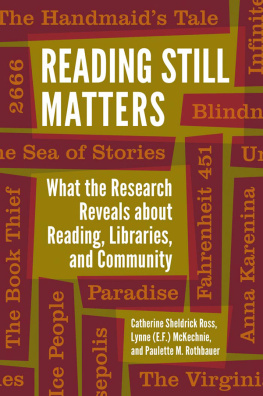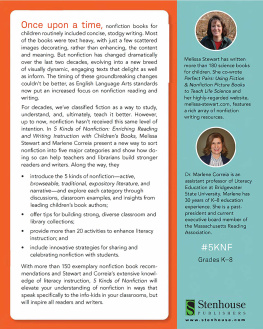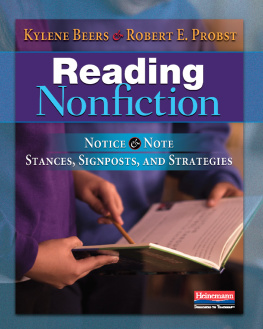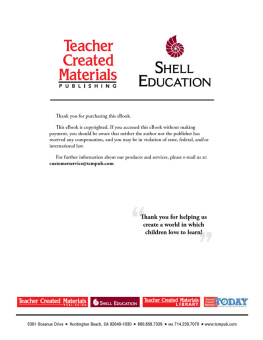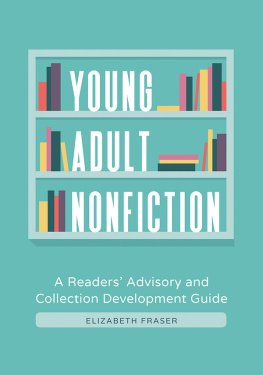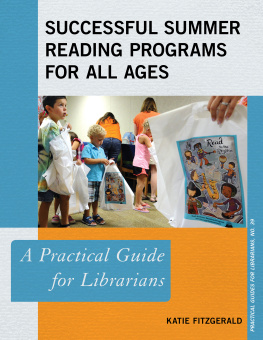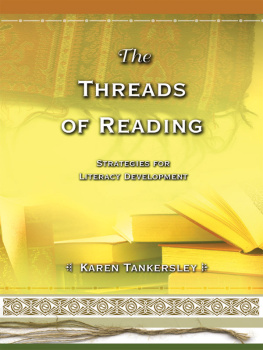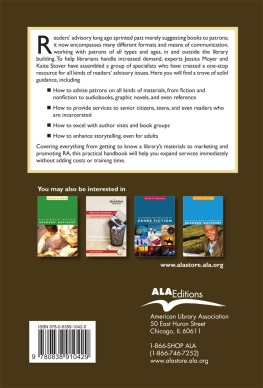
Copyright 2018 by Catherine Sheldrick Ross, Lynne (E. F.) McKechnie, and Paulette M. Rothbauer
All rights reserved. No part of this publication may be reproduced, stored in a retrieval system, or transmitted, in any form or by any means, electronic, mechanical, photocopying, recording, or otherwise, except for the inclusion of brief quotations in a review, without prior permission in writing from the publisher.
Library of Congress Cataloging in Publication Control Number: 2017051877
ISBN: 9781440855764 (paperback)
9781440855771 (ebook)
22 21 20 19 181 2 3 4 5
This book is also available as an eBook.
Libraries Unlimited
An Imprint of ABC-CLIO, LLC
ABC-CLIO, LLC
130 Cremona Drive, P.O. Box 1911
Santa Barbara, California 93116-1911
www.abc-clio.com
This book is printed on acid-free paper 
Manufactured in the United States of America
Contents
Catherine Sheldrick Ross
Lynne (E. F.) McKechnie
Paulette M. Rothbauer
Catherine Sheldrick Ross
Preface
It has been more than 10 years since the publication of Reading Matters: What the Research Reveals about Reading, Libraries, and Community (2006). Reading Matters has been cited in both scholarly and professional publications and is held in the collections of many public and academic libraries in North America and internationally. Colleagues teaching in MLIS programs have written to tell us that they have put sections of the book on syllabi for courses dealing variously with reading, readers advisory, public libraries, and childrens and young adult (YA) literature. But these colleagues say they want an update. During the last 10 years, there has been a burgeoning of new research about the reading experience in all its many facets. Some international groups and associations concerned with reading for pleasure have formed to sponsor conferences and publish proceedings on aspects of pleasure reading. This new book provides a roundup of new work together with a restatement of what has not changed. As was the case with Reading Matters, the new book is written for people interested in reading and in the role that reading plays in peoples lives. We continue to focus on the intersection of reading, libraries, and communities and expect our primary audience to be library staff, library trustees, and students in Library and Information Science (LIS) programs. But we also hope our book will be relevant to parents, teachers, and community members who have an interest in reading, especially pleasure reading.
Library staff, in particular, have a gut feeling that reading is a Good Thing and that libraries should playand do playa vital role in promoting it. But library staff often find it hard to explain why. This book helps them know why and will help them articulate the why to otherssuch as to board members and trustees who mistakenly think that libraries are improved when popular materials, including bestsellers, series books, comics, and romance titles, are downplayed. Teachers and parents sometimes need to be reassured of the value of pleasure reading, a domain where libraries have taken a lead role. What the research shows is that people become readers by doing lots of reading of extended text; that what motivates novice readers is the pleasure of the reading experience itself; and that libraries, schools, and communities need to support pleasure reading by making the books accessible, by helping readers choose books, by celebrating and modeling the love of reading, and by creating communities of readerseither face-to-face or in an electronic environmentwho share the excitement of books. Yes, education and learning are crucial to an individuals successful negotiation of the challenges of life in a modern economy. But first comes the pleasure of reading, which is the cornerstone for all those other desirable outcomes such as academic success, civic engagement, and so on.
Since our first book, Reading Matters, research on reading and the reading experience has multiplied, and we have tried to include the new material that we have found most useful, thought provoking, or interesting. New research has been published on long-standing areas of interest such as the history of books and reading, the experience of audiences and readers, popular genres of reading, the value of popular culture, book clubs, communities of readers, and the role of libraries in promoting literacy and reading. Improvements in the technology for listening to audio books and reading on screens have expanded readers participation in new ways of reading. As a consequence, the definition of what constitutes the reading experience itself has changed, and we advocate a broadly inclusive definition. Some new concerns have moved to center stage, including the following: research on reading and the brain, digital reading, multiliteracies, and shared reading and therapeutic practices.
There is an embarrassment of riches here, but the literature is scattered and fragmentary, published variously in scholarly journals and in monographs from the various disciplines of education, literary studies, cultural studies, media studies, history, sociology, psychology, and LIS. For our first book, we were guided by the conviction that library-oriented readers would benefit from having an accessible single source that draws together the scattered findings that relate to reading and the librarys role in fostering reading. Although many useful books and websites are available on leisure reading, most focus on one or another specialized aspect of readingfor example, guides to genre fiction, handbooks for reading groups, guides to collection development, how-to-do-it advice on readers advisory, self-reports by avid readers on a year of reading. Or they focus on one or another segment of the reading publicfor example, children or YA readers or romance readers or science fiction readers. This book takes a synoptic approach to pleasure reading. It includes the entire lifespan of the reader from childhood through adolescence to adult and a broad spectrum of reading formats and genres. Teachers and students in LIS programs have told us that they have found the book useful in their courses and personally encouraging to themselves as enthusiastic readers. Therefore, the goal of Reading Still Matters remains the same as before: to provide a map to the research findings, organized according to themes that are central to people interested in the intersection of reading, readers, and libraries.
In Reading Still Matters, about 80 percent is new text. We have cut sections dealing with issues that seem no longer contentious or that havent changed since the first book, specifically sections on the so-called fiction problem, reading as a transaction, series books, the boy problem, reading high and low, and how adult readers choose books. We refer you to Reading Matters for coverage of these topics. In addition to updating and substantially rewriting almost every section to emphasize work published in the past decade, we have added new sections on the following: digital reading, readicide, multimodalities and multiliteracies, the popularity of YA literature, comics, special communities of YA readers, censorship and prohibited reading, and therapeutic reading. Because so much has changed about the technologies for reading, we discuss digital formats throughout the book and stress the ways in which print is currently cohabiting with other media. Readers now have many choices about the kinds of materials they read and what formats they choose, often becoming deeply attached to one or another format and hostile to others. We end the book with a gift for avid readersall of youan annotated list of enjoyable novels that center, in one way or another, on the pleasures of reading.

